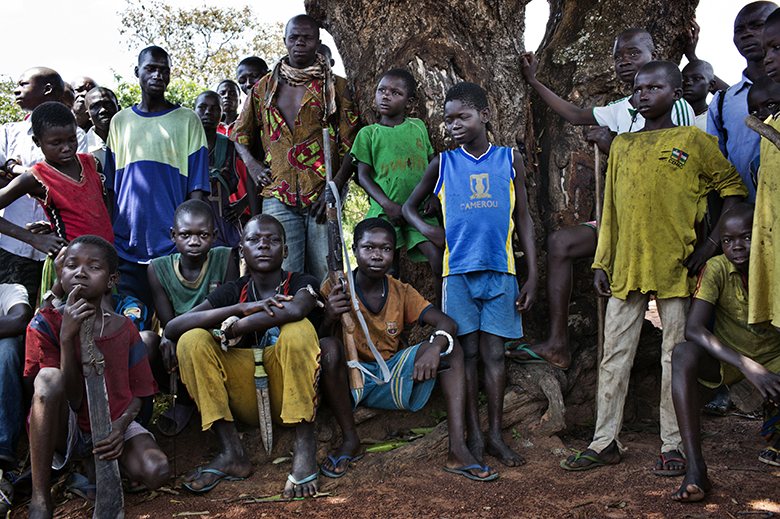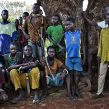
Anti-Balaka Militias Target Muslims in the Central African Republic
Publication: Terrorism Monitor Volume: 12 Issue: 3
By:

Recent fighting in the resource-rich Central African Republic (CAR) is inflicting a “human disaster” on the country. [1] Nearly one million residents of the country have been displaced, a majority of them from the northwestern region of the CAR that borders Cameroon and Chad, with over 370,000 displaced persons now in the country’s capital of Bangui (Reuters, January 28). Approximately 2.2 million people, more than half of the country’s population, are in immediate need of humanitarian assistance (UN News Centre, January 6). According to Reuters’s estimate, at least 2,000 people were killed in the fighting between ethnic communities in the CAR during December 2013, when the Séléka rebel army overthrew the government of President François Bozize, an ethnic Gbaya (Reuters, January 28; al-Jazeera [Doha], December 15, 2013; for more information see Terrorism Monitor, January 9; April 3, 2013). Séléka is primarily composed of Muslim ethnic Gula, whose strength is bolstered by experienced Chadian and Sudanese volunteers.
Following Séléka’s seizure of power in Bangui in April 2013, the organization’s leader, Michel Djotodia, was elected as the CAR’s interim president. Séléka, although officially disbanded by Djotodia, is accused by several international organizations of perpetrating systematic killings, rape, torture and the destruction of over 1,000 homes throughout the country. [2]
In response to Bozize’s ouster, and the human rights abuses and killings conducted by Séléka fighters, anti-balaka (balaka = “machete” in the CAR’s official Sangho language) militias, first organized by the deposed president as village-level, anti-Séléka forces in the northwestern CAR, have emerged as major combatants in the communal fighting that is ravaging the country (AFP, January 2). A significant number of anti-balaka fighters report that they joined their militias out of a desire to protect themselves and their families from Séléka, which they associate with the rule of Djotodia. Djotodia’s removal from power was one of the key and consistent demands of the anti-balaka militias (Jeune Afrique [Paris], December 21, 2013). The announcement of Djotodia’s abdication from power was reported to have been met with widespread celebration in areas of Bangui where anti-Séléka and anti-balaka militias are believed to have the strongest social base (BFMTV [Paris], January 12).
Rural areas in the northwest CAR are reported to be suffering from intense violence between Séléka forces bolstered by Chadians and anti-balaka militiamen. Violence has been the worst in the rural regions in the vicinity of the large towns of Bossemptele, Baoro and Bozoum, where Christians and Muslims are neighbors (PANA [Dakar], January 28).
Currently, a 3,700-strong African Union-led peacekeeping force, Mission international de soutien a la Centrafrique sous conduite africaine (MISCA – International Support Mission to the Central African Republic) supplements a 1,600-soldier French expeditionary force as part of the French military’s “Operation Sangaris.” The French and MISCA forces are primarily deployed in and around the capital of Bangui and are expected to be supplemented by a 500-soldier European Union peacekeeping force, whose mandate was approved by the United Nations on January 28 (Reuters, January 31).
Complicating the mission for French and African Union peacekeepers in the CAR, the local, community-based nature of anti-balaka militias, organized on an ad hoc basis to attack Muslims suspected of being members of or sympathetic to Séléka, frequently makes it difficult for the peacekeepers to determine which members of the community are anti-balaka or guilty of attacks against Muslims (Le Parisien, December 18, 2013). French peacekeepers based in Bangui are also reportedly viewed with suspicion by Muslim residents, and are accused of being a biased military force that is ignoring or assisting anti-balaka militiamen in attacks against the city’s Muslim community (Anadolu Agency [Ankara], December 18, 2013). Similarly, Christian residents of Bangui who are sympathetic to the anti-balaka, claim that Chadian peacekeepers provide support, including weapons, to remnants of the Séléka militias in the capital (Reuters, December 26, 2013).
Chadian residents of Bangui, a large number of whom are descended from families who have lived in the city for over half a century, have been the targets of attacks by anti-balaka militia fighters, leading to an estimated 20,000 Chadians leaving the CAR for Chad (IRIN, January 9). Figures released by the Chadian Embassy in Bangui indicate that 57 Chadian residents have been killed in the city since March 2013, and 10 Chadian soldiers deployed with MISCA were killed in fighting with anti-balaka militias in December 2013 (France 24, January 7). Violence directed against Muslim residents in Bangui by anti-balaka fighters is also reported to target Senegalese, Malian, Cameroonian and Nigerian Muslims, forcing many of these foreign nationals to leave the CAR, depleting one of the primary social groups responsible for the important livestock and trade sectors of the CAR’s economy (IRIN, January 9; France 24, January 7).
Anti-balaka militias are particularly concentrated in the mixed sectarian northwestern region of the CAR, and in the capital of Bangui, where the anti-balaka fighting groups consist of rural migrants who fled communal violence in the northwest and sought the removal of Djotodia from power (Liberation [Paris], December 25, 2013). The majority of the anti-balaka are Christian fighters, although it is not clear whether the anti-balaka identify primarily as a “Christian” force. There are also believed to be a significant number of animist fighters in the various anti-balaka militias that have been raised in the northwestern CAR and in Bangui (Agenzia Fides [Rome], January 27).
The Bangui neighborhood of Boeing (near the international airport) is reported to be a stronghold of anti-balaka militias, with one anti-balaka group in the neighborhood claiming to have 15,000 fighters (Reuters, January 16; AP, December 15). Boeing is near a major French military camp for Operation Sangaris and has absorbed an estimated 100,000 displaced people.
Anti-balaka fighters are reported to be a mix of local militiamen and former CAR soldiers of the Forces Armées Centra-africaines (FACA – Central African Armed Forces) who were supporters of former president Bozize (AP, December 15, 2013; al-Jazeera [Doha], December 5, 2013). Currently, anti-balaka militias are believed to have varying levels of organization, with some of the fighting groups receiving military training from former FACA soldiers (ITELE [Paris], December 16, 2013).
The anti-balaka militias in the CAR represent a complicated challenge for peacekeepers as the country moves towards a political transition from the rule of Djotodia. Anti-balaka militias do not appear to have a centralized leadership structure, and anti-balaka fighters are driven as much by a desire for revenge against Séléka and its sympathizers for the group’s attacks against civilian communities, as by disagreements over political power. Rising communal tensions, a worsening humanitarian crisis and uncertainty over the ability of international peacekeepers to prevent more widespread violence amongst the country’s combatants, particularly in the rural northwest of the country, are taking on a sectarian overtone. If this sectarian combat in the CAR continues, it could draw other regional actors, such as militant Salafist groups tied to al-Qaeda in the Islamic Maghreb (AQIM) and Nigeria’s Boko Haram and Ansaru groups, into a war over control of the country’s abundant natural resources – including oil, uranium, diamonds and gold – that could fund militant Salafist insurgencies throughout the African continent.
Nicholas A. Heras is an independent analyst and consultant on Middle East issues and a former David L. Boren Fellow.
Notes
1. “CAR: AU Must Deploy Remaining Peacekeepers to Protect Civilians from Imminent Attack,” Amnesty International, January 28, 2014, https://www.amnesty.org/en/news/central-african-republic-au-must-deploy-remaining-peacekeepers-protect-civilians-imminent-attac.
2. “I Can Still Smell the Dead: The Forgotten Human Rights in the Central African Republic,” Human Rights Watch, September 18, 2013, https://www.hrw.org/sites/default/files/reports/car0913_ForUploadWInsert.pdf.





